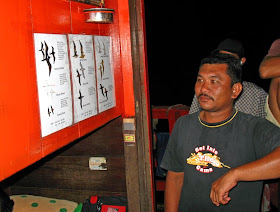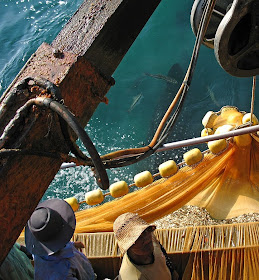
Another early start; another long day in the sun on the cards!

Watching the nets go overboard! It took us several hours to find the first decent-sized shoal of anchovies - lots of time staring at the sea and some distant terns!
You can watch a video of the process here:
This is the signal the birds have been waiting for, and terns appear out of nowhere in large flocks.
This time the flocks were made up predominantly of Common and White-winged Terns. Interesting to see so many 'marsh terns' out in the open sea - we estimated 2,000 White-winged and saw only 1 Whiskered Tern.

Most of the White-winged were adults moulting into non-breeding plumage.

There were a few 1st winter-plumaged birds, but this was the best I could get of one.

The White-winged Terns seemed more anxious to perch on the net floats than to catch fish!

Bottoms up! They had quite a job to stay balanced on the bobbing floats!

Sometimes there were accidents!
The Common Terns were even more abundant; we estimated 3,000 from what we could see, but the actual number could have been far higher.



Adults were all in mid-wing moult. Notice the grey rump - supposedly a distinguishing feature of White-cheeked Tern.

Plunge-diving for anchovies caught in the net!

We could afford to let them have a few!

There were only a couple of hundred Bridled Terns around today. I think this must be a juvenile.

This might be an adult in non-breeding plumage.

And this looks like an adult moulting out of breeding plumage.

We saw very few Black-naped Terns today - perhaps only 5 or 6.

What's this coming out of the sun? Looks interesting!

What a beak it has!


In better light the mystery is solved - a superb Lesser Crested Tern - bird of the day!

We presented the fishermen with a poster of nine seabird-types - Bridled and Common-type terns, noddy, petrel, shearwater, tropicbird, frigatebird, jaeger and booby. The poster has our phone numbers on so they can call us if they see anything other than the terns. On seeing the poster, they immediately identified the birds they'd seen in June as petrels, on account of their tube-noses. When they checked Robson, they were unanimous in pointing to Bulwer's Petrel. There had been up to 7 birds for about a week, and, according to the fishermen, they appear every year in June at the time the westerly winds occur. There are currently no west coast records of Bulwer's Petrel, so we'll just have to wait for next June!
Like last trip, the highlight of the day was not a bird but a fish.

When I was watching the net being winched in, I saw a large dark shape swimming beneath it. Moments later, a Whale Shark surfaced! Note the Bridled Tern on the left which gives an idea of scale!


According to the books, Whale Sharks are supposed to be plankton feeders, but this guy or gal was definitely after fish - the ones in our net!

A Jaws-moment. It's BEHIND YOU!

Apparently this one was just a tiddler - only about 12 feet long we estimated. They can grow to 40 feet long! Still - it was an impressive-enough sight!

Coming in for another gum-attack on the net!

Here are some of Choo Eng's shots of the beast's approach.


Apparently these fish are very docile and friendly to swimmers and divers. So... after you! You can see the Cobia fish that accompany the shark everywhere, scavenging for food leftovers. For more info on cobias, see here (Thanks for the correction Choo Eng!). The Whale Shark's Malay name translates as 'black mother shark', and they call these fish her 'children'!

Steaming in not-so-docilely toward the net!


Hungry shark!
Once we'd started moving again, after gathering in the catch, the shark followed in our wake for a while. I found it fascinating that it showed no fear toward us and seemed to associate the boat with food. What an amazing animal! It made the day for me, and was one of the most memorable experiences of my entire life I think. Now I want to see a forty-footer!
Nice! LC tern is amazing! Lucky you to see the whale shark. Some people pay thousands of ringgit to see it but they didn't!
ReplyDeletenice encountered with whale shark dave !
ReplyDeleteSome of the smaller fishes swimming
ReplyDeletein front of the Whale Shark are
"Cobia" or in Malay known as "Haruan Tasik" or rather inappropriately "Lake Snakehead". Although this fish does look like a "Snakehead" it is only found at sea and yields fairly good eating white meat and they can grow to as big as the freshwater Giant Snakehead or by the Malay name of "Toman". But the Chinese name for it is "Sea Snakehead".
Choo Eng.
U guys get to go on all these amazing trips ... i get to babysit a Mah Meri weaver the whole weekend!!!
ReplyDelete